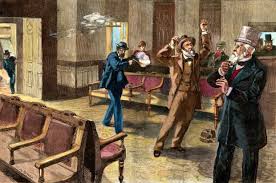This Day, 2019:
Donald Trump became the first sitting President to set foot in North Korea. Speaking of Kim jong-un in 2018, he said "we fell in love," that NK was disarming and was no a longer a threat - one of the president's bigger lies (Photo: Brendan Smialowski / AFP Getty)
Donald Trump became the first sitting President to set foot in North Korea. Speaking of Kim jong-un in 2018, he said "we fell in love," that NK was disarming and was no a longer a threat - one of the president's bigger lies (Photo: Brendan Smialowski / AFP Getty)

This Day, 1812:
With America at war again with Britain, James Madison issued an emergency appeal for new military officers. In 1812, the U.S. Army and Navy was an all-volunteer force (as it is today) and was considered weaker in both numbers and weaponry than Britain (more)
With America at war again with Britain, James Madison issued an emergency appeal for new military officers. In 1812, the U.S. Army and Navy was an all-volunteer force (as it is today) and was considered weaker in both numbers and weaponry than Britain (more)

Madison urged Congress to increase emergency commissions of officers, adjutants, quartermasters, engineers and more. Among the troops who distinguish themselves in the War of 1812 were two future presidents: William Henry Harrison and Andrew Jackson
This Day, 1882:
James Garfield’s assassin was executed. Charles Guiteau shot the 20th president the year before at a Washington train station. Garfield lingered for 11 weeks before passing away. He was the second president to be murdered in 16 years (there would be three in 36)
James Garfield’s assassin was executed. Charles Guiteau shot the 20th president the year before at a Washington train station. Garfield lingered for 11 weeks before passing away. He was the second president to be murdered in 16 years (there would be three in 36)

Books can change the world:
This Day in 1906, President Roosevelt and lawmakers demanded better meat inspection, after reading "The Jungle," a horrifying report on U.S. meatpacking plants by the journalist Upton Sinclair
This Day in 1906, President Roosevelt and lawmakers demanded better meat inspection, after reading "The Jungle," a horrifying report on U.S. meatpacking plants by the journalist Upton Sinclair

This Day, 1921:
Warren Harding (L) appointed former President William Howard Taft to be Chief Justice of the Supreme Court. Taft was easily confirmed, becoming the only person in history to head both the executive and judicial branches of government
Warren Harding (L) appointed former President William Howard Taft to be Chief Justice of the Supreme Court. Taft was easily confirmed, becoming the only person in history to head both the executive and judicial branches of government

This Day, 1950:
Harry Truman ordered U.S. ground forces to Korea to help repel an invasion by communist North Korea. He feared it was the beginning of World War III. The Korean War killed 36,516 Americans - and 70 years later, some 7,700 others remain missing #koreanwar70years
Harry Truman ordered U.S. ground forces to Korea to help repel an invasion by communist North Korea. He feared it was the beginning of World War III. The Korean War killed 36,516 Americans - and 70 years later, some 7,700 others remain missing #koreanwar70years

• • •
Missing some Tweet in this thread? You can try to
force a refresh













